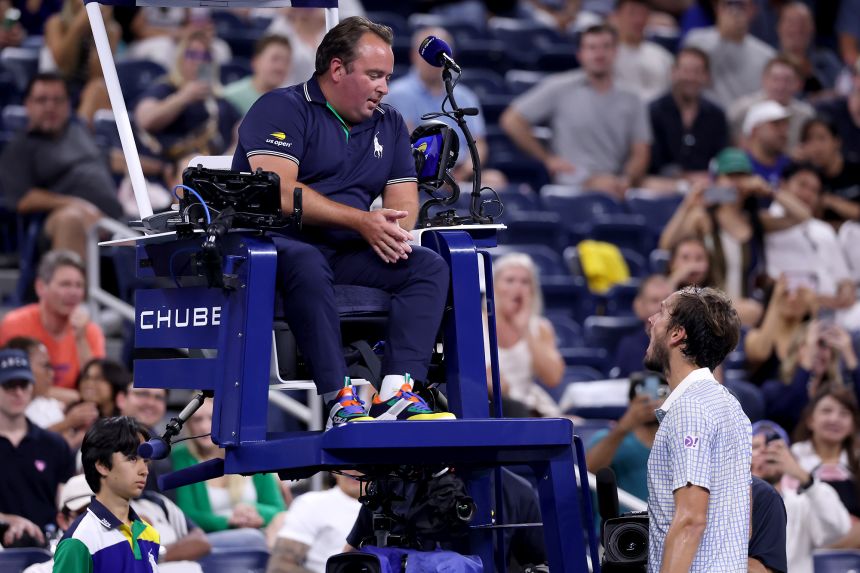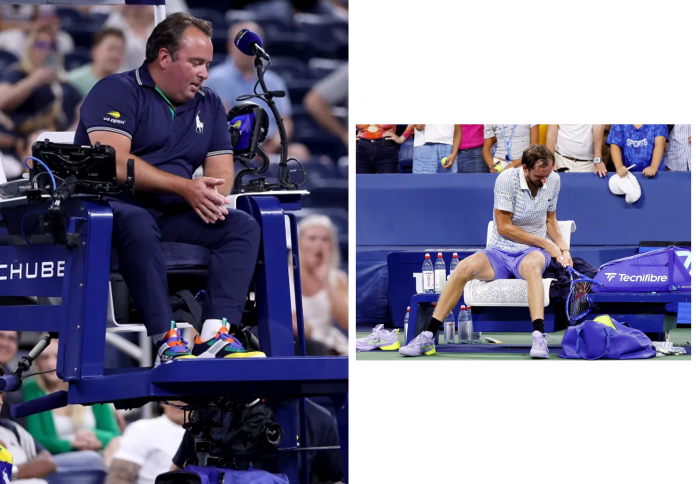Former US Open champion Daniil Medvedev faced a spectacular—and costly—meltdown during his first-round loss at the 2025 tournament, resulting in a staggering total fine of $42,500. The dramatic incident unfolded during a high-stakes moment in the third set of his five-set defeat to France’s Benjamin Bonzi when a controversial chair umpire’s ruling following a photographer’s incursion sent the Russian into a furious tirade. The penalty, which comprised sanctions for unsportsmanlike conduct and racket abuse, ultimately consumed more than a third of his $110,000 prize money for the tournament, underscoring the severe financial consequences of his on-court fury.
The Contest That Culminated In Chaos
Daniil Medvedev’s 2025 US Open campaign ended prematurely in a shock first-round five-set defeat to Benjamin Bonzi, but it was the dramatic scenes in the third set that dominated the headlines. The former world number one and 2021 champion found himself serving at 6-3, 7-5, 5-4, with Bonzi holding match point. It was at this critical juncture that the match descended into chaos: a photographer errantly walked onto the court between the Frenchman’s first and second serves, causing an immediate disruption.
Chair umpire Greg Allensworth halted play, ordered the photographer off the court, and then, controversially, awarded Bonzi a second first serve due to the on-court interference. This ruling, perceived as unjust by the Russian, served as the flashpoint for Medvedev’s emotional explosion. This defeat marked a disappointing end to what had already been a turbulent Grand Slam season for Medvedev, further cementing his reputation for emotional volatility on the sport’s biggest stages.
The Fury And The Financial Penalty
Medvedev’s immediate reaction to the umpire’s decision was one of intense rage. He aggressively approached the umpire’s chair, engaging in a heated argument with Greg Allensworth that quickly escalated. During the lengthy confrontation, the Russian verbally abused the official and actively riled up the crowd, shouting comments into the court microphones such as, “Are you a man? Why are you shaking? He wants to go home, guys, he doesn’t like to be here. He gets paid by the match, not by the hour.”
The protracted delay, which lasted more than six minutes as boos and chants echoed around Louis Armstrong Stadium, contributed to the unsportsmanlike conduct charge. Tournament referee Jake Garner ultimately imposed a hefty $30,000 fine for the verbal tirade and inciting the crowd. The total financial penalty, levied for two separate infractions, quickly swallowed up a significant portion of the player’s earnings from the event.
Racket Abuse And The Aftermath
While the on-court tirade accounted for the majority of the fine, Medvedev’s frustration was far from spent. After Bonzi eventually sealed the 6-3, 7-5, 6-7(5), 0-6, 6-4 victory, the former champion sat disconsolately on his chair before unleashing a final act of visible anger. He repeatedly smashed his racket against his courtside chair, utterly destroying the equipment in a fit of pique that earned him an additional $12,500 penalty for racket abuse.

The combined fine of $42,500 was a stark reminder of the financial cost of emotional outbursts in professional tennis. The incident prompted sharp commentary from tennis greats, with six-time Grand Slam champion Boris Becker publicly branding the episode a “public meltdown” and suggesting the Russian star should seek professional help to manage his intense emotions, highlighting the extreme nature of the display.
A Pattern Of Intensity And Controversy
The drama at the 2025 US Open was not an isolated incident but the latest chapter in Medvedev’s history of on-court confrontations and emotional volatility. In fact, this single fine added to a growing record of penalties, following a larger $76,000 fine he received earlier in the season at the Australian Open for unsportsmanlike behavior. That previous incident included a sanction for breaking a net camera during his first-round match, further illustrating his struggles to contain his temper when under pressure.
Despite his past success, including his maiden Grand Slam title in New York, the Russian’s penchant for dramatic displays continues to overshadow his athletic achievements. While some commentators, like former US Open champion Andy Roddick, admit the drama can be entertaining, the recurring theme of high-profile outbursts raises persistent questions about his emotional management and its impact on his overall performance and public image.











